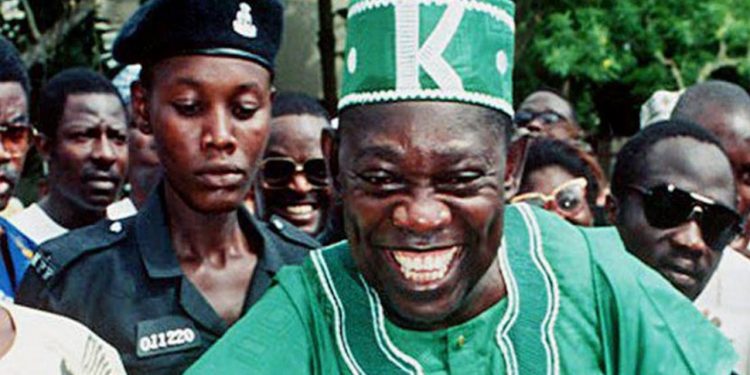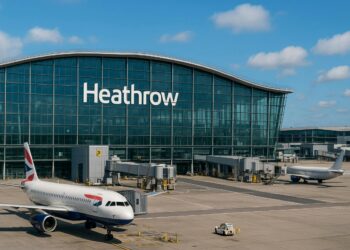In announcing his running mate the APC flagbearer, Senator Bola Tinubu said, ‘The spirit of 1993 is upon us’, which was in reference to the 1993 presidential election where MKO Abiola ran on a joint muslim-muslim ticket.
This was a claim Tinubu made while rationalizing his choice of the former governor of Borno State, Kashim Shettima.
How does this resonate in the scheme of things? Tinubu said that his choice of muslim-muslim ticket “represents a milestone in Nigeria’s political history”, while trying to compare it on all fours with the events of 1993 Nigerian presidential elections.
No doubt, the 1993 generational elections in Nigeria was a true political milestone. In addition, the current events leading to the 2023 presidential elections may also reasonably be seen as a milestone in Nigeria’s political history.
However, whether both political events – that is the experience of 1993 and that of 2023 can comparatively align as milestones in Nigeria’s political history for the same reasons, depends on who you ask, and how deeper you dig.
The 1993 presidential election was generally adjudged to be free, fair and reasonably credible. It was reasonably presumed to have been won by the late MKO Abiola, a southern Muslim on a joint ticket with another Muslim from the north.
Notwithstanding this obvious fault line, at least from the political sensibilities currently Nigeria, this two Muslims went ahead to win the presidential election, cruising home with victory, even in Christian dominated areas with massive victories.
Difference between 1993 and 2023. These two election will have about 30 years between them. Within this very lengthy period a lot of water have passed under Nigeria`s political bridge. These are the issues we will now look at below:
Religious Sensitivity
In 1993 MKO Abiola, was the candidate of the Social Democratic Party (SDP), while his running mate was Babagana Kingibe. Both were Muslims and made no pretense about it.
In fact, religion was never an issue in the campaign, nor was it ever raised at any time during the primaries or choice of a running mate in the 1993 general elections.
This is not the same thing in the present time when religion has become a very sensitive issue in our national psychology.
The controversy about muslim-muslim ticket became a debatable issue even before the party primaries were concluded by the various political parties.
The rejection of the thought of a muslim-muslim ticket for APC went to a fever pitch right after the party primary was concluded. The issue was so unpopular that the discussion went even beyond the APC party line.
That is how sensitive the issue of religion has become in today`s political milieu in Nigeria.
Threat of “Islamization”
Again, in 1993, there was no threat of Islamization of Nigeria by the Muslim power block, threat which the regime of President Muhammadu Buhari, a northern Muslim has given so much clout more than ever.
No doubt, the religious differences in Nigeria is not new. It is as old as the 1914 amalgamation. Yet, prior to President Buhari`s regime, there was never such a danger of Islamizing the nation, nor was there even a talk such a possibility.
However, in the present time, the danger of Islamization which started off as a rumour has now gained solid ground and has been collaborated by someone as highly placed and well connected as former military and civilian head of state, former president Olusegun Obasanjo.
Terrorism and Banditry
In 2023, the muslim-muslim presidential ticket for a major party like the All Progressive Congress is undoubtedly a red flag for the twin demons of terrorism and banditry in a country like Nigeria.
The reason for this is not far-fetched. President Buhari`s government have largely been blamed for the inception and spread of these two major dangerous security issues in the country.
President Buhari, a northern Muslim is noted to have performed far below expectation in tackling banditry and the terrorist activities perpetuated by Fulani herders across the country.
Also related to the criminality and the dangers posed by the Fulani headers is similarly, terrorism perpetuated by Boko Haram and the Islamic State of West Africa (ISWAP).
One common denominator for those behind the terrorist activities is their religion – Islam. Irrespective of their nomenclature or the groups, which they align with, all perpetuators of these evils are Muslims.
It is also worthy of note that in the face of all these rising insecurity from these criminal groups, especially the criminal element of the Fulani herders who have spread violence, adductions and killings nationwide, President Buhari have failed to ferociously rise to the challenge.
At least not in the same way and manner he has done and still dealing with issues relating to the harmless agitation by the Indigenous People of Biafra (IPOB), who are non-Muslims.
President Buhari have even failed to properly refer to the criminal Fulani headers as terrorists, but instead prefers to call them bandits, while proscribing IPOB before even a single bullet was shot by the Biafra secessionist group, who say they only fight in self-defense.
Agitations for Self-determination
1993 has no record of agitation for self-determination by any major tribal group. Not even the agitation by the late Ken Saro-Wiwa has gathered any real momentum prior to the 1993 general election when MKO Abiola ran on a muslim-muslim ticket.
In any case anyway, his agitation was not about self-determination, but largely against environmental degradation of the land and waters of Ogoniland by the operations of the multinational petroleum industry, especially the Royal Dutch Shell company.
However, fast-forward 30 years after, the 2023 presidential election will be fought on issues that concerns groups and individuals who are actively agitating to secede from the Nigerian state.
These groups includes Christians who feel justifiably disgusted from the failures of Muslim led government in Nigeria as at date.
Quality of Candidates
Next is the quality of candidates in the 1993 election and the upcoming 2023 election. The first look is at the quality of the APC flagbearer, Bola Tinubu who is fielding a fellow Muslim in 2023, as well as MKO Abiola who did same in 1993.
The late MKO Abiola was a known philanthropist and wealth creator who built wealth from ground to top. His business ventures are all well-known as well as the source of his wealth as a billionaire, and this was long before he ventured into politics.
Also, Abiola`s academic credentials were unquestionable. His basic and postgraduate qualifications and the schools he attended had no controversies whatsoever.
In contrast, Senator Bola Tinubu, the APC presidential candidate unfortunately does not tick these columns without controversy.
The only similarity about Abiola and Tinubu is that they were Muslims, Yoruba and allegedly both accountants.
However, while Abiola`s profession and performance as accountant has clarity, that of Tinubu is still been questioned, less than 8 months to the 2023 presidential election.
The Peter Obi Factor
Last but not the least is the revolution that the candidacy of the presidential candidate of the Nigeria`s Labour party (LP), Mr Peter Obi has brought into the 2023 equation.
The Peter Obi movement seems like EndSARS 2.0, and what the first revolution lacked is exactly what the Labour Party candidate brings to the table – the face of the revolution and the leadership that provides the direction.
The Peter Obi factor alone makes all the difference between the presidential election of 1993 and that of 2023 considering current developments in Nigeria`s political circle.
In true sense of the claim by the APC presidential candidate, if there is any development in the current political season that “represents a milestone in Nigeria’s political history”, it is the emergence of Mr Peter Obi as a presidential candidate.
It is not Tinubu`s decision to choose Kashim Shettima as a running mate as Bola Tinubu Claimed.
Peter Obi has transformed from a presidential candidate to a political movement, or better still to Nigeria`s political revolution, and on the forefront is the energetic Nigerian youths, whose first attempt to a revolution during the 2020 faceless EndSARS saga fizzled out due to lack of leadership.
The Peter Obi movement seems like EndSARS 2.0, and what the first revolution lacked is exactly what the Labour Party candidate brings to the table – the face of the revolution and the leadership that provides the direction.
So right now, the clock is ticking down to the moment that consistency of the current Peter Obi movement will be tested, while Tinubu`s decision to run a joint muslim-muslim ticket will also be tested.












